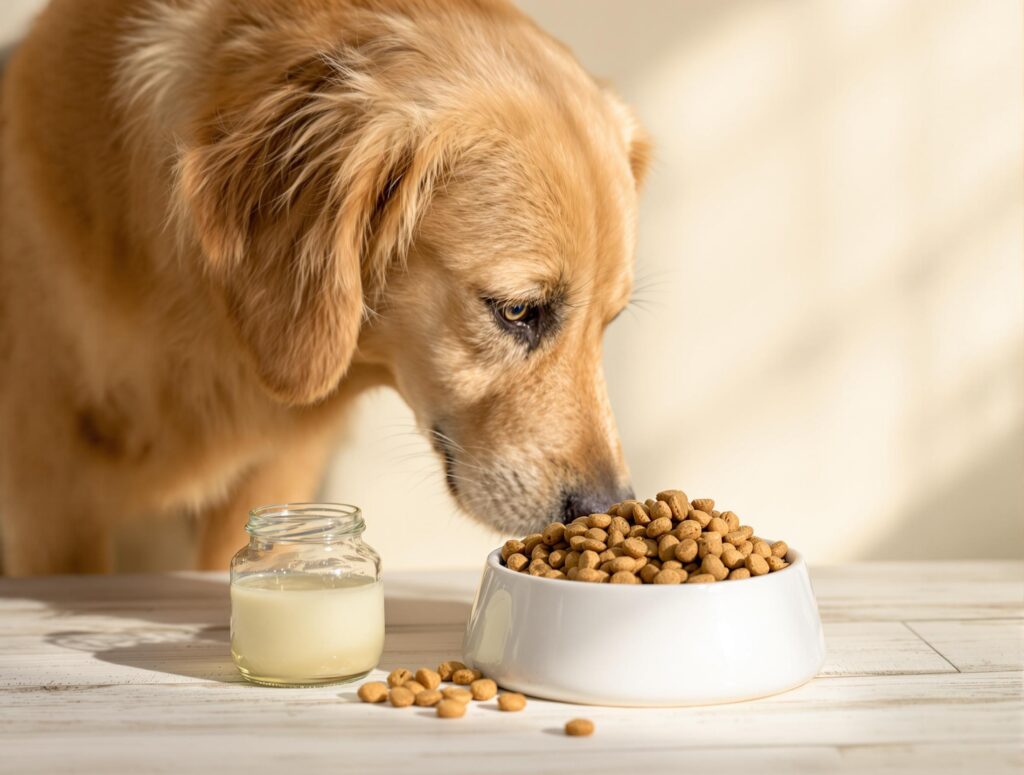Is Coconut Oil Safe for Dogs to Eat? What You Should Know

Key Takeaways
- Coconut oil is generally safe for dogs in small amounts, but should be introduced slowly and with vet guidance.
- Potential benefits include mild digestive support, added energy, and improved meal appeal, though the evidence is limited.
- Too much coconut oil can cause weight gain, stomach upset, or complications for dogs with certain health conditions.
Coconut oil has earned a spot in many human wellness routines, and now it is making its way into dog bowls across the country. With its appealing flavor and a long list of suggested benefits, it is easy to see why pet parents are curious about adding this natural oil to their dog’s diet.
From skin and coat support to potential digestive benefits, coconut oil offers a range of uses, but knowing how and when to use it safely is key. At PetHealthMD, we are here to help you understand how this supplement fits into your dog’s wellness plan with insights grounded in veterinary guidance.
Potential Health Benefits of Coconut Oil for Dogs
Coconut oil shows up in many health trends, so it is no surprise some pet parents are curious about adding it to their dog’s meals. While it is generally safe in small amounts, it is not a magic fix, and the benefits you hear about are not backed by much solid research yet.
Still, if your vet gives you the green light, here are a few ways it might help:
- May settle mild tummy troubles: A small amount mixed into dog food might help with your dog’s digestion, but go slow and watch for changes.
- Gives a little energy boost: The fats in coconut oil are quickly absorbed and can provide an extra burst of energy for playtime or training, especially for active pups.
- Makes meals more appealing: If your dog is picky, adding a bit of coconut oil can sometimes make dry food more enticing.
- Could support aging brains: MCTs, a type of saturated fat found in coconut oil, have been linked to cognitive support in older dogs, though this research was not directly done with coconut oil.
- May help with stool consistency: For dogs with occasional irregularity, a small dose might help keep things moving more smoothly.
It is important not to overdo it. Too much can lead to diarrhea or weight gain. Start small, see how your dog does, and always check in with your vet before making any changes to their diet.

How to Safely Introduce Coconut Oil to Your Dog’s Diet
Before scooping coconut oil into your dog’s bowl, it is important to think about how it might affect them. While it is usually safe in small amounts, it is not the right fit for every pup and how you introduce it matters just as much as whether you introduce it at all.
Ease into It Gradually
Coconut oil might be safe for many dogs in moderation, but how you introduce it makes a difference. Begin with a tiny amount, just a quarter teaspoon for small dogs, half a teaspoon for medium ones, and up to a teaspoon for large breeds.
Watch Your Dog’s Response
Some dogs do not skip a beat, while others might have a harder time adjusting. If your dog seems off, maybe more tired than usual or uninterested in even its favorite food, it is time to pause. These changes do not always mean something serious, but they are worth mentioning to your vet. It is always easier to tweak your approach early on than to fix an issue later.
Potential Risks of Coconut Oil for Dogs
While a natural product like coconut oil can seem totally safe, it can still cause problems for some dogs. Whether it is a sensitive stomach or a health condition that does not mix well with added fat, it is good to know what to watch for.
Here are some potential risks to be aware of:
- Extra pounds: With its high fat content, coconut oil can sneak in more calories than expected. That is a problem for dogs who are already prone to weight gain.
- Upset stomach: Diarrhea, softer stools, or gurgling sounds after meals could mean your dog’s not handling the oil well.
- Trouble for dogs with health issues: If your dog has pancreatitis, liver problems, or is on a low-fat plan, coconut oil could make things worse instead of better.
- Reactions or sensitivities: Occasionally, dogs can react to new foods with itchiness or changes in digestion, even if the food is natural.
- Fat-related complications: Some dogs may develop higher blood fat levels over time, which could raise health concerns, especially for dogs with heart risks.
Coconut oil might be fine in small doses, but it is not always a great fit. If your dog has health issues or reacts to fatty foods, it is best to skip it or ask your vet for a safer option that still supports your dog’s wellness.
Making Smart Choices for Your Pet
When used correctly, coconut oil can support your dog’s overall wellness, but it is important to tailor its use to your dog’s unique needs. Gradual introduction and guidance from your vet make a big difference in how your dog responds.
At PetHealthMD, we encourage thoughtful, informed choices when it comes to pet health. Talk with your veterinarian before introducing coconut oil to ensure it complements your dog’s individual needs and fits into their overall nutrition plan. For more ways to support your dog’s wellness, explore our Dog category.





